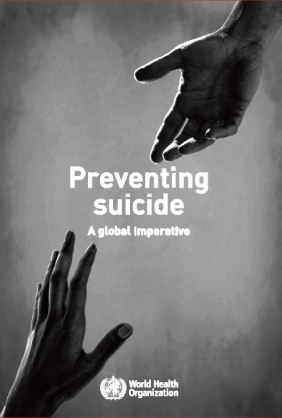 5 September 2014, Cairo, Egypt – Today, WHO publishes a global report “Preventing suicide: a global imperative”. The report reveals that suicide is a serious public health problem worldwide.
5 September 2014, Cairo, Egypt – Today, WHO publishes a global report “Preventing suicide: a global imperative”. The report reveals that suicide is a serious public health problem worldwide.
Every year, over 800 000 people die from suicide, roughly one death every 40 seconds. Each year, suicide claims more lives than homicide and war combined.
This is WHO’s first global report on suicide prevention and it presents a comprehensive overview of suicide, suicide attempts and suicide prevention efforts worldwide. It identifies evidence-based approaches to policy-making and programme development on suicide prevention that can be adapted to different settings.
The release of the report comes just before World Suicide Prevention Day, which is observed every year on 10 September. WHO calls on countries to develop and implement comprehensive suicide prevention strategies worldwide.
Preventing suicide is a global imperative
”Preventing suicide: a global imperative” is the most comprehensive, up-to-date record of the current status of suicide prevention.
The report follows the adoption of the Comprehensive Mental Health Action Plan 2013–2020 by the World Health Assembly, in which all WHO Member States committed to reducing their suicide rates by 10% by 2020.
Suicide in the WHO Eastern Mediterranean Region
In the WHO Eastern Mediterranean Region, estimated suicide rates are generally lower compared to other WHO regions. “Religious and socio-cultural norms about suicidal behaviour may explain to some extent why reported suicide mortality rates are lower in this region than in other regions,” says WHO Regional Director for the Eastern Mediterranean Dr Ala Alwan.
However, there is evidence that among certain age groups in this region, suicide rates are relatively high, particularly among young women and men aged 15–29 years, and women and men aged 60 years and above.
Suicide is often the result of a series of events and factors over the course of a person’s life rather than the result of a single event or factor.
Preventing suicide
There is much that can be done to prevent suicide. “First and foremost, policy and legislative actions are needed,” says Dr Alwan. “Side-by-side with these, there is a need to raise public and professional awareness of suicide as a public health problem, so that space for rational discussion and action for suicide prevention is enhanced”.
Strategies involving restriction of access to common methods of suicide, such as firearms or toxic substances like pesticides; prevention and treatment of depression and alcohol and substance abuse; and follow-up contact with those who have attempted suicide have proven effective in reducing suicide rates.
“It is essential that we improve the reliability of suicide certification and reporting,” adds Dr Alwan “to craft the needed strategies and interventions”. The need is especially paramount now because a number of countries are experiencing acute and/or chronic humanitarian emergencies which can contribute to an up surge in suicide rates through prolonged exposure to adversity. Enhanced vulnerability to mental disorders and reduction in the capacity of health and social institutions to provide succor when needed most.
Based on multisectoral approaches, “Preventing suicide: a global imperative” provides a resource to assist governments in developing and implementing effective strategies for the prevention of suicide involving both health and non-health sectors.
For more information, please contact:
Dr Khalid Saeed
WHO Regional Adviser for Mental Health and Substance Abuse
Tel: +202 227 65368/+2 0106 068 9523
email:
Rana Sidani
Senior Communications Officer
WHO Regional Office
Tel: +2 01099756506,
email:
website: www.emro.who.int/mnh
About World Suicide Prevention Day
World Suicide Prevention Day brings together individuals and organizations with an interest in suicide prevention, and mobilizes efforts to save lives. Efforts to prevent suicide have been celebrated on this Day, recurring on September 10th each year since 2003. In 2014, the theme of World Suicide Prevention Day is “Suicide prevention: One world connected”. The theme reflects the fact that connections are important at several levels if we are to combat suicide.
To learn more, visit World Suicide Prevention Day - 10 September, 2014.
About WHO
In the 21st century, health is a shared responsibility, involving equitable access to essential care and collective defence against transnational threats. WHO is the directing and coordinating authority for health within the United Nations system. It is responsible for providing leadership on global health matters, shaping the health research agenda, setting norms and standards, articulating evidence-based policy options, providing technical support to countries and monitoring and assessing health trends.
To learn more, visit World Health Organization.
Related links
Preventing suicide: a global imperative (report) | Arabic
WHO: Preventing suicide: a global imperative (film)
Watch the film with Arabic subtitles | Short play film with Arabic subtitles
Living with a black dog [Short animated film about depression and advice on the best way to talk to people living with depression]








